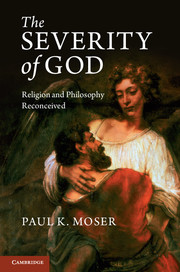Preface and acknowledgements
Published online by Cambridge University Press: 05 February 2013
Summary
Preface and acknowledgements
Human talk of God is often cheap and easy, and self-serving too. It thus leaves us with a god unworthy of the morally perfect title “God.” This book takes a different route, in order to move away from counterfeits and toward the real article. Our expectations for God, if God exists, often get in the way of our receiving salient evidence of God. We assume that God would have certain obligations to us, even by way of giving us clear evidence, and when those obligations are not met we discredit God, including God’s existence. This is a fast track to atheism or at least agnosticism. We need, however, to take stock of which expectations for God are fitting and which are not, given what would be God’s perfect moral character and will.
Perhaps God is not casual but actually severe, in a sense to be clarified, owing to God’s vigorous concern for the realization of divine righteous love (agapē), including its free, unearned reception and dissemination among humans. Perhaps the latter concern stems from God’s aim to extend, without coercion, lasting life with God to humans, even humans who have failed by the standard of divine agapē. God’s vigorous commitment to that goal could figure in God’s making human life difficult, or severe, for the sake of encouraging humans, without coercion, to enter into a cooperative good life with God. This severe God would not sacrifice a human soul to preserve human bodily comfort. In this scenario, divine agapē is the unsurpassed power and priority of life with God, and humans need to struggle to appropriate it as such, in companionship with God. It comes as a free gift, by grace, from God, but the human reception of it, via cooperative trust in God, includes stress, struggle, and severity in the face of conflicting powers and alternative priorities.
- Type
- Chapter
- Information
- The Severity of GodReligion and Philosophy Reconceived, pp. ix - xiiPublisher: Cambridge University PressPrint publication year: 2013



